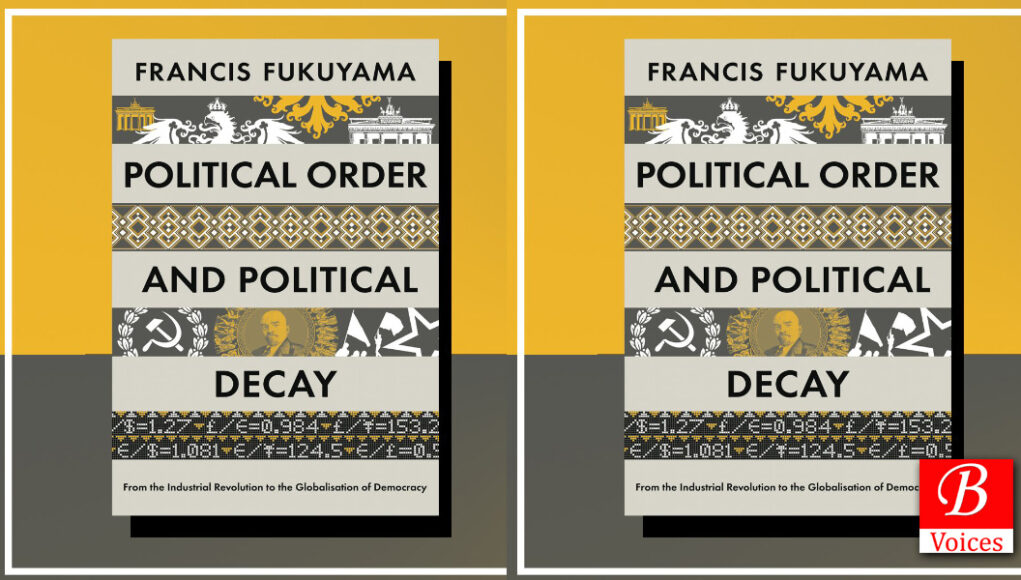 Qamber Ali
Qamber Ali
After the end of the cold war, the fall of the Soviet Union significantly introduced the winning conception of ideological liberal democracy. Francis Fukuyama’s essay, “End of History?” became a raising debate of criticism inclining with the tenets of liberal democracy as the only form of government that can sustain. Fukuyama wanted us to think about democracy which was installed globally. Soon later, he published the book, “The End of History and the last man”. This time endorsed an imperial idea which later, proposed another book, “The origins of Political Order; with a deep analysis of historical evolution of Chinese state to the western liberal democracies—England, Denmark, and United States. Political Order and Decay is the second volume of Fukuyama’s intellectual debate which I, only will disclose the disquisition of its First Part—The State; primarily, he examines political development, its dimensions, bureaucracy, corruption, patronage, and clientelism, Nation-building, good government and significance of liberal democracy.
The amount of research that Fukuyama develops in the book ambitiously proceeds with political development through liberal democracy—where he discovers the structure of development procedures or decaying of polities after changing of societies. The failure of democracy, he suggests, rests with low-level or extreme level institutionalization. For democracy to sustain, there must remain a balance of institutional development that possibly legitimizes itself towards accountability. Otherwise, darkness in democracy is inevitable in the case of the US or a developing state like Pakistan. Moreover, the transparency of successful liberal democracies combines three elements; the state, rule of law, and procedural accountability.
The state, contemporarily, examines modern states that are less impersonal— that are not based on patrimonial and recruiting persons with favoritism. However, it has a distinction between the private interest of rulers and public community interests.
The second element of a successful state is “rule of law” rather than “rule by law” or “rule for the law” Rule of law results in accountability which governments focus on the Aristotelian concept of “common good”. The third element is the resultant of rule of law. Rule of law engenders the idea of liberal democracy and procedural accountability—in which free and fair elections allow citizens to choose and discipline their rulers. However, the problem to procedural accountability, what I believe, is the determination of choosing feudal or machine politicians in a society that is unfamiliar to the notions of western liberal democracy or masses who are not educated with intellectual rigidity. I presume, it is due to a lack of policies that manipulate poor masses and shelter populist regimes. Political development, Fukuyama considers, “it is an evolutionary process” and institutions fail to sustain and decay due to changes in the society.
Furthermore, he portrays the factors behind a good government that shadows modern democratic states. Such as Denmark. It is due to the long history of meritocracy, patronage, reciprocal effectiveness, coherence, and different social groups—that gave rise to the middle classes after industrialization and is a crucial example of modern liberal democracy. This book describes the evolution of German bureaucracy in the 19th century which developed in a rapid process. USA and Britain developed an effective public sector with meritocratic principles. The former, with new interest groups, developed a public sector of government effectively from 1880 to 1930s. It provided Pendleton civil service reform act; the latter, Britain brought significant efforts in Northcote-Trevelyan reforms of bureaucratic meritocracy which in early times, was dominated by patronage elites of Oxford and Cambridge graduates.
To conclude on reciprocal-altruism, one has to note that Fukuyama’s principles on good governance are effective, however; with the rise of technological evolution; large interest groups and exclusive data-elites are examples of populist culture and exclusive liberty. They can profoundly, change the course of liberal democratic statecraft to authoritarian digital dictatorships in which surveillance capitalism and disinformation are hot conflicts of the post-modern time. It may decay the modern political institutions into more complex undemocratic institutions. Moreover, to watch the horror of liberal-equality in the domestic windscreen of fictional algorithms; the proceeding result signifies more equality in globalization but, it also has side effects of censorships, populism, exclusivity, and fascist regimes. Such alike; Indian journalists were allegedly put on surveillance using Pegasus.
Fukuyama advocates the idea of “renationalization” which locks democratic institutions by oligarchic classes of wealthy elites that exclusively focus on their interests.
More so on endorsing political development; Fukuyama concludes in the first part of the book by figuring two pathways to good modern government. The first is through military competition with meritocratic recruitment and bureaucratic organizations to manage fiscal and logistics. The second is a peaceful political reform by forming a coalition of social groups interested in the efficiency of serving in the prescribed will. To the Fukuyama’s logical ends, states that have developing self-esteem principalities to reach as a State like Denmark, it has not certain principle to reach however, it is a long process of development. So for that, decay of polities is pervasive that take a long route to Order and decay.
The Author is a Student of Political Science at GCU Lahore and belongs to Turbat, Balochistan. He tweets at @qambibaloch.
Disclaimer: Views expressed in this article are those of the author and Balochistan Voices not necessarily agrees with them.
Share your comments!








